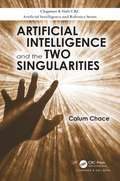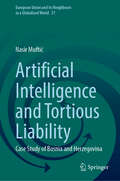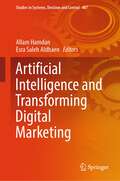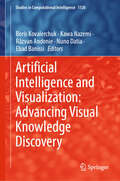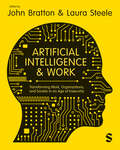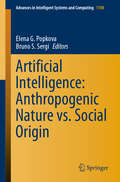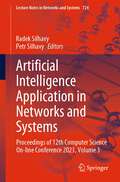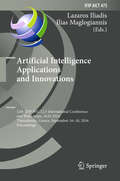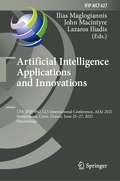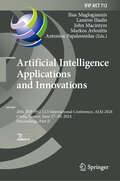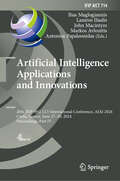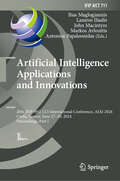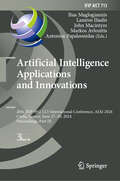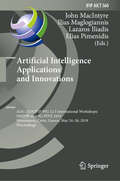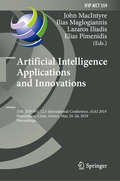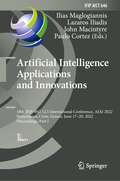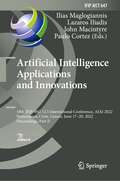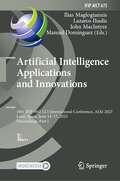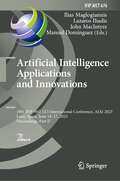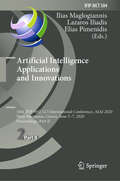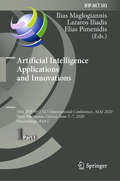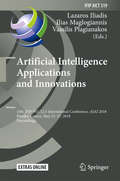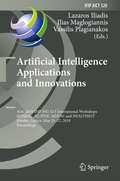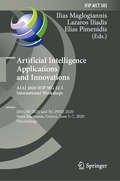- Table View
- List View
Artificial Intelligence and the Two Singularities (Chapman & Hall/CRC Artificial Intelligence and Robotics Series)
by Calum ChaceThe science of AI was born a little over 60 years ago, but for most of that time its achievements were modest. In 2012 it experienced a big bang, when a branch of statistics called Machine Learning (and a sub-branch called Deep Learning) was applied to it. Now machines have surpassed humans in image recognition, and they are catching up with us at speech recognition and natural language processing. Every day, the media reports the launch of a new service, a new product, and a new demonstration powered by AI. When will it end? The surprising truth is, the AI revolution has only just begun. Artificial Intelligence and the Two Singularities argues that in the course of this century, the exponential growth in the capability of AI is likely to bring about two "singularities" - points at which conditions are so extreme that the normal rules break down. The first is the economic singularity, when machine skill reaches a level that renders many of us unemployable and requires an overhaul of our current economic and social systems. The second is the technological singularity, when machine intelligence reaches and then surpasses the cognitive abilities of an adult human, relegating us to the second smartest species on the planet. These singularities will present huge challenges, but this book argues that we can meet these challenges and overcome them. If we do, the rewards could be almost unimaginable. This book covers: • Recent developments in AI and its future potential • The economic singularity and the technological singularity in depth • The risks and opportunities presented by AI • What actions we should take Artificial intelligence can turn out to be the best thing ever to happen to humanity, making our future wonderful almost beyond imagination. But only if we address head-on the challenges that it will raise. Calum Chace is a best-selling author of fiction and non-fiction books and articles, focusing on the subject of artificial intelligence. He is a regular speaker on artificial intelligence and related technologies, and runs a blog on the subject at www.pandoras-brain. com. Prior to becoming a full-time writer and speaker, he spent 30 years in business as a marketer, a strategy consultant, and a CEO. He studied philosophy at Oxford University, where he discovered that the science fiction he had been reading since boyhood was simply philosophy in fancy dress.
Artificial Intelligence and Tortious Liability: Case Study of Bosnia and Herzegovina (European Union and its Neighbours in a Globalized World #21)
by Nasir MuftićThis book examines whether current liability systems can handle cases involving artificial intelligence (AI). It questions whether general liability rules, designed to be technology-agnostic, are adequate for AI-related accidents. While focusing on Bosnia and Herzegovina, it addresses issues relevant across Europe, offering answers based on common principles and tort law rules.The book begins with an introduction to AI technology and associated civil law challenges regarding e.g. autonomy, data importance, and non-transparency. It then discusses the broader context of civil law issues, the role of liability systems, rule-making levels and timing, and ancillary mechanisms like insurance and safety standards. The bases of liability in Bosnia and Herzegovina are examined, including objective and subjective liability, product liability, and vicarious liability. The allocation of liability is also addressed, focusing on AI&’s autonomy and loss of user control, and evaluating traditional liability allocation principles. Finally, the book analyzes why those harmed by AI might be worse off than those affected by conventional adverse events.
Artificial Intelligence and Transforming Digital Marketing (Studies in Systems, Decision and Control #487)
by Allam Hamdan Esra Saleh AldhaenThis book explores how AI is transforming digital marketing and what it means for businesses of all sizes and looks at how AI is being used to personalize content, improve targeting, and optimize campaigns. This book also examines some of the ethical considerations that come with using AI in marketing.
Artificial Intelligence and Visualization: Advancing Visual Knowledge Discovery (Studies in Computational Intelligence #1126)
by Ebad Banissi Kawa Nazemi Boris Kovalerchuk Răzvan Andonie Nuno DatiaThis book continues a series of Springer publications devoted to the emerging field of Integrated Artificial Intelligence and Machine Learning with Visual Knowledge Discovery and Visual Analytics that combine advances in both fields. Artificial Intelligence and Machine Learning face long-standing challenges of explainability and interpretability that underpin trust. Such attributes are fundamental to both decision-making and knowledge discovery. Models are approximations and, at best, interpretations of reality that are transposed to algorithmic form. A visual explanation paradigm is critically important to address such challenges, as current studies demonstrate in salience analysis in deep learning for images and texts. Visualization means are generally effective for discovering and explaining high-dimensional patterns in all high-dimensional data, while preserving data properties and relations in visualizations is challenging. Recent developments, such as in General Line Coordinates, open new opportunities to address such challenges.This book contains extended papers presented in 2021 and 2022 at the International Conference on Information Visualization (IV) on AI and Visual Analytics, with 18 chapters from international collaborators. The book builds on the previous volume, published in 2022 in the Studies in Computational Intelligence. The current book focuses on the following themes: knowledge discovery with lossless visualizations, AI/ML through visual knowledge discovery with visual analytics case studies application, and visual knowledge discovery in text mining and natural language processing. The intended audience for this collection includes but is not limited to developers of emerging AI/machine learning and visualization applications, scientists, practitioners, and research students. It has multiple examples of the current integration of AI/machine learning and visualization for visual knowledge discovery, visual analytics, and text and natural language processing. The book provides case examples for future directions in this domain. New researchers find inspiration to join the profession of the field of AI/machine learning through a visualization lens.
Artificial Intelligence and Work: Transforming Work, Organizations, and Society in an Age of Insecurity
by John Bratton Laura SteeleIn an era marked by insecurity from neoliberalism, financial volatility, political instability, regional conflicts, pandemics, and the climate crisis, Artificial Intelligence (AI) is revolutionizing our work, organizations, societies, and the environment. This critical text explores who truly benefits from AI′s development and deployment, offering a comprehensive overview of AI′s nature, history, and applications. It delves into crucial themes such as the future of work, digitalization, neoliberalism′s impact, power dynamics, ethics, inequality, gender, race, intersectional discrimination, and environmental sustainability. Unlike practical machine learning guides, this book examines how AI and AI-based technologies are transforming work, highlighting both benefits and potential harms. Combining critical management and leadership studies with organizational sociology, it addresses societal implications, inequality, ethics, and power often overlooked by other textbooks. John Bratton′s lucid and engaging writing style brings a cutting-edge subject to life, blending breadth, critical analysis, and academic rigor. Contemporary examples illustrate AI′s real-life implications for organizations and work today, while thought-provoking questions encourage readers to engage with and reflect on the topics throughout. Authored by John Bratton, an Honorary Professor at Queen’s University Belfast, and Laura Steele, a Senior Lecturer in Business and Society at Queen’s University Belfast, this interdisciplinary text is essential for students studying contemporary and emerging issues in business and management, including AI, business analytics, digitalization, and the future of work. It is also recommended for courses on the sociology of work, ethics, organization studies, management, leadership, and HRM. This book is poised to become an essential textbook for courses on AI, digitalization, and the future of work, making it a valuable resource for students and educators alike.
Artificial Intelligence and Work: Transforming Work, Organizations, and Society in an Age of Insecurity
by John Bratton Laura SteeleIn an era marked by insecurity from neoliberalism, financial volatility, political instability, regional conflicts, pandemics, and the climate crisis, Artificial Intelligence (AI) is revolutionizing our work, organizations, societies, and the environment. This critical text explores who truly benefits from AI′s development and deployment, offering a comprehensive overview of AI′s nature, history, and applications. It delves into crucial themes such as the future of work, digitalization, neoliberalism′s impact, power dynamics, ethics, inequality, gender, race, intersectional discrimination, and environmental sustainability. Unlike practical machine learning guides, this book examines how AI and AI-based technologies are transforming work, highlighting both benefits and potential harms. Combining critical management and leadership studies with organizational sociology, it addresses societal implications, inequality, ethics, and power often overlooked by other textbooks. John Bratton′s lucid and engaging writing style brings a cutting-edge subject to life, blending breadth, critical analysis, and academic rigor. Contemporary examples illustrate AI′s real-life implications for organizations and work today, while thought-provoking questions encourage readers to engage with and reflect on the topics throughout. Authored by John Bratton, an Honorary Professor at Queen’s University Belfast, and Laura Steele, a Senior Lecturer in Business and Society at Queen’s University Belfast, this interdisciplinary text is essential for students studying contemporary and emerging issues in business and management, including AI, business analytics, digitalization, and the future of work. It is also recommended for courses on the sociology of work, ethics, organization studies, management, leadership, and HRM. This book is poised to become an essential textbook for courses on AI, digitalization, and the future of work, making it a valuable resource for students and educators alike.
Artificial Intelligence: Anthropogenic Nature vs. Social Origin (Advances in Intelligent Systems and Computing #1100)
by Elena G. Popkova Bruno S. SergiThis book presents advanced research studies on the topic of artificial intelligence as a component of social and economic relations and processes. It gathers research papers from the International Research-to-Practice Conference “The 21st Century from the Positions of Modern Science: Intellectual, Digital and Innovative Aspects” (May 23–24, 2019, Nizhny Novgorod, Russia) and the International Research-to-Practice Conference “Economics of Pleasure: a Science of Enjoying Economic Activities” (October 3–5, 2019, Prague, Czech Republic). Both conferences were organized by the Autonomous Non-Profit Organization “Institute of Scientific Communications” (Volgograd). What sets this book apart from other publications on the topic of artificial intelligence is that it approaches AI not as a technological tool, but as an economic entity. Bringing together papers by representatives of various fields of social and human knowledge, it systematically reflects on various economic, social, and legal aspects of the creation, application, and development of artificial intelligence. Given the multidisciplinary nature of its content, the book will appeal to a broad target audience, including those engaged in developing AI (scientific research institutes and universities), and Industry 4.0 enterprises interested in its implementation, as well as state regulators for the digital economy.
Artificial Intelligence Application in Networks and Systems: Proceedings of 12th Computer Science On-line Conference 2023, Volume 3 (Lecture Notes in Networks and Systems #724)
by Radek Silhavy Petr SilhavyThe application of artificial intelligence in networks and systems is a rapidly evolving field that has the potential to transform a wide range of industries. The refereed proceedings in this book is from the Artificial Intelligence Application in Networks and Systems session of the Computer Science Online Conference 2023 (CSOC 2023), which was held online in April 2023. The section brings together experts from different fields to present their research and discuss the latest trends and challenges. One of the key themes in this section is the development of intelligent systems that can learn, adapt, and optimize their performance in real time. Researchers are exploring how AI algorithms can be used to create autonomous networks and systems that can make decisions without human intervention. Furthermore, this section highlights the use of AI in improving network performance and efficiency. Researchers are exploring how AI algorithms can be used to optimize network routing, reduce congestion, and improve the quality of service. These efforts can help organizations save costs and improve user experience.
Artificial Intelligence Applications and Innovations: 12th IFIP WG 12.5 International Conference and Workshops, AIAI 2016, Thessaloniki, Greece, September 16-18, 2016, Proceedings (IFIP Advances in Information and Communication Technology #475)
by Lazaros Iliadis Ilias MaglogiannisArtificial Intelligence applications build on a rich and proven theoretical background to provide solutions to a wide range of real life problems. The ever expanding abundance of information and computing power enables researchers and users to tackle higly interesting issues for the first time, such as applications providing personalized access and interactivity to multimodal information based on preferences and semantic concepts or human-machine interface systems utilizing information on the affective state of the user. The purpose of the 3rd IFIP Conference on Artificial Intelligence Applications and Innovations (AIAI) is to bring together researchers, engineers, and practitioners interested in the technical advances and business and industrial applications of intelligent systems. AIAI 2006 is focused on providing insights on how AI can be implemented in real world applications.
Artificial Intelligence Applications and Innovations: 17th IFIP WG 12.5 International Conference, AIAI 2021, Hersonissos, Crete, Greece, June 25–27, 2021, Proceedings (IFIP Advances in Information and Communication Technology #627)
by Lazaros Iliadis Ilias Maglogiannis John MacintyreThis book constitutes the refereed proceedings of the 17th IFIP WG 12.5 International Conference on Artificial Intelligence Applications and Innovations, AIAI 2021, held virtually and in Hersonissos, Crete, Greece, in June 2021.The 50 full papers and 11 short papers presented were carefully reviewed and selected from 113 submissions. They cover a broad range of topics related to technical, legal, and ethical aspects of artificial intelligence systems and their applications and are organized in the following sections: adaptive modeling/ neuroscience; AI in biomedical applications; AI impacts/ big data; automated machine learning; autonomous agents; clustering; convolutional NN; data mining/ word counts; deep learning; fuzzy modeling; hyperdimensional computing; Internet of Things/ Internet of energy; machine learning; multi-agent systems; natural language; recommendation systems; sentiment analysis; and smart blockchain applications/ cybersecurity. Chapter “Improving the Flexibility of Production Scheduling in Flat Steel Production Through Standard and AI-based Approaches: Challenges and Perspective” is available open access under a Creative Commons Attribution 4.0 International License via link.springer.com.
Artificial Intelligence Applications and Innovations: 20th IFIP WG 12.5 International Conference, AIAI 2024, Corfu, Greece, June 27–30, 2024, Proceedings, Part II (IFIP Advances in Information and Communication Technology #712)
by Lazaros Iliadis Ilias Maglogiannis John Macintyre Antonios Papaleonidas Markos AvlonitisThis book constitutes the refereed proceedings of the 20th IFIP WG 12.5 International Conference on Artificial Intelligence Applications and Innovations, AIAI 2024, held in Corfu, Greece, during June 27–30, 2024. The 100 full papers and 8 short papers included in this book were carefully reviewed and selected from 213 submissions. The diverse nature of papers presented demonstrates the vitality of AI algorithms and approaches. It certainly proves the very wide range of AI applications as well.
Artificial Intelligence Applications and Innovations: 20th IFIP WG 12.5 International Conference, AIAI 2024, Corfu, Greece, June 27–30, 2024, Proceedings, Part IV (IFIP Advances in Information and Communication Technology #714)
by Lazaros Iliadis Ilias Maglogiannis John Macintyre Antonios Papaleonidas Markos AvlonitisThis book constitutes the refereed proceedings of the 20th IFIP WG 12.5 International Conference on Artificial Intelligence Applications and Innovations, AIAI 2024, held in Corfu, Greece, during June 27–30, 2024. The 100 full papers and 8 short papers included in this book were carefully reviewed and selected from 213 submissions. The diverse nature of papers presented demonstrates the vitality of AI algorithms and approaches. It certainly proves the very wide range of AI applications as well.
Artificial Intelligence Applications and Innovations: 20th IFIP WG 12.5 International Conference, AIAI 2024, Corfu, Greece, June 27–30, 2024, Proceedings, Part I (IFIP Advances in Information and Communication Technology #711)
by Lazaros Iliadis Ilias Maglogiannis John Macintyre Antonios Papaleonidas Markos AvlonitisThis book constitutes the refereed proceedings of the 20th IFIP WG 12.5 International Conference on Artificial Intelligence Applications and Innovations, AIAI 2024, held in Corfu, Greece, during June 27–30, 2024. The 100 full papers and 8 short papers included in this book were carefully reviewed and selected from 213 submissions. The diverse nature of papers presented demonstrates the vitality of AI algorithms and approaches. It certainly proves the very wide range of AI applications as well.
Artificial Intelligence Applications and Innovations: 20th IFIP WG 12.5 International Conference, AIAI 2024, Corfu, Greece, June 27–30, 2024, Proceedings, Part III (IFIP Advances in Information and Communication Technology #713)
by Lazaros Iliadis Ilias Maglogiannis John Macintyre Antonios Papaleonidas Markos AvlonitisThis book constitutes the refereed proceedings of the 20th IFIP WG 12.5 International Conference on Artificial Intelligence Applications and Innovations, AIAI 2024, held in Corfu, Greece, during June 27–30, 2024. The 100 full papers and 8 short papers included in this book were carefully reviewed and selected from 213 submissions. The diverse nature of papers presented demonstrates the vitality of AI algorithms and approaches. It certainly proves the very wide range of AI applications as well.
Artificial Intelligence Applications and Innovations: AIAI 2019 IFIP WG 12.5 International Workshops: MHDW and 5G-PINE 2019, Hersonissos, Crete, Greece, May 24–26, 2019, Proceedings (IFIP Advances in Information and Communication Technology #560)
by John MacIntyre Ilias Maglogiannis Lazaros Iliadis Elias PimenidisThis book constitutes the refereed proceedings of two International Workshops held as parallel events of the 15th IFIP WG 12.5 International Conference on Artificial Intelligence Applications and Innovations, AIAI 2019, in Hersonissos, Crete, Greece, in May 2019: the 8th Mining Humanistic Data Workshop, MHDW 2019, and the 4th Workshop on 5G-Putting Intelligence to the Network Edge, 5G-PINE 2019.The 6 full papers and 4 short papers presented at MHDW 2019 were carefully reviewed and selected from 13 submissions; out of the 14 papers submitted to 5G-PINE 2019, 6 were accepted as full papers and 1 as short paper. The MHDW papers focus on the application of innovative as well as existing data matching, fusion and mining and knowledge discovery and management techniques (such as decision rules, decision trees, association rules, ontologies and alignments, clustering, filtering, learning, classifier systems, neural networks, support vector machines, preprocessing, post processing, feature selection, visualization techniques) to data derived from all areas of humanistic sciences, e.g., linguistic, historical, behavioral, psychological, artistic, musical, educational, social, and ubiquitous computing and bioinformatics. The papers presented at 5G-PINE focus on several innovative findings coming directly from modern European research in the area of modern 5G telecommunications infrastructures and related innovative services and cover a wide variety of technical and business aspects promoting options for growth and development.
Artificial Intelligence Applications and Innovations: 15th IFIP WG 12.5 International Conference, AIAI 2019, Hersonissos, Crete, Greece, May 24–26, 2019, Proceedings (IFIP Advances in Information and Communication Technology #559)
by John MacIntyre Ilias Maglogiannis Lazaros Iliadis Elias PimenidisThis book constitutes the refereed proceedings of the 15th IFIP WG 12.5 International Conference on Artificial Intelligence Applications and Innovations, AIAI 2019, held in Hersonissos, Crete, Greece, in May 2019.The 49 full papers and 6 short papers presented were carefully reviewed and selected from 101 submissions. They cover a broad range of topics such as deep learning ANN; genetic algorithms - optimization; constraints modeling; ANN training algorithms; social media intelligent modeling; text mining/machine translation; fuzzy modeling; biomedical and bioinformatics algorithms and systems; feature selection; emotion recognition; hybrid Intelligent models; classification - pattern recognition; intelligent security modeling; complex stochastic games; unsupervised machine learning; ANN in industry; intelligent clustering; convolutional and recurrent ANN; recommender systems; intelligent telecommunications modeling; and intelligent hybrid systems using Internet of Things. The papers are organized in the following topical sections:AI anomaly detection - active learning; autonomous vehicles - aerial vehicles; biomedical AI; classification - clustering; constraint programming - brain inspired modeling; deep learning - convolutional ANN; fuzzy modeling; learning automata - logic based reasoning; machine learning - natural language; multi agent - IoT; nature inspired flight and robot; control - machine vision; and recommendation systems.
Artificial Intelligence Applications and Innovations: 18th IFIP WG 12.5 International Conference, AIAI 2022, Hersonissos, Crete, Greece, June 17–20, 2022, Proceedings, Part I (IFIP Advances in Information and Communication Technology #646)
by Ilias Maglogiannis Lazaros Iliadis John Macintyre Paulo CortezThis book constitutes the refereed proceedings of five International Workshops held as parallel events of the 18th IFIP WG 12.5 International Conference on Artificial Intelligence Applications and Innovations, AIAI 2022, virtually and in Hersonissos, Crete, Greece, in June 2022: the 11th Mining Humanistic Data Workshop (MHDW 2022); the 7th 5G-Putting Intelligence to the Network Edge Workshop (5G-PINE 2022); the 1st workshop on AI in Energy, Building and Micro-Grids (AIBMG 2022); the 1st Workshop/Special Session on Machine Learning and Big Data in Health Care (ML@HC 2022); and the 2nd Workshop on Artificial Intelligence in Biomedical Engineering and Informatics (AIBEI 2022). The 35 full papers presented at these workshops were carefully reviewed and selected from 74 submissions.
Artificial Intelligence Applications and Innovations: 18th IFIP WG 12.5 International Conference, AIAI 2022, Hersonissos, Crete, Greece, June 17–20, 2022, Proceedings, Part II (IFIP Advances in Information and Communication Technology #647)
by Ilias Maglogiannis Lazaros Iliadis John Macintyre Paulo CortezThis book constitutes the refereed proceedings of five International Workshops held as parallel events of the 18th IFIP WG 12.5 International Conference on Artificial Intelligence Applications and Innovations, AIAI 2022, virtually and in Hersonissos, Crete, Greece, in June 2022: the 11th Mining Humanistic Data Workshop (MHDW 2022); the 7th 5G-Putting Intelligence to the Network Edge Workshop (5G-PINE 2022); the 1st workshop on AI in Energy, Building and Micro-Grids (AIBMG 2022); the 1st Workshop/Special Session on Machine Learning and Big Data in Health Care (ML@HC 2022); and the 2nd Workshop on Artificial Intelligence in Biomedical Engineering and Informatics (AIBEI 2022). The 35 full papers presented at these workshops were carefully reviewed and selected from 74 submissions.
Artificial Intelligence Applications and Innovations: 19th IFIP WG 12.5 International Conference, AIAI 2023, León, Spain, June 14–17, 2023, Proceedings, Part I (IFIP Advances in Information and Communication Technology #675)
by Ilias Maglogiannis Lazaros Iliadis John MacIntyre Manuel DominguezThis two-volume set of IFIP-AICT 675 and 676 constitutes the refereed proceedings of the 19th IFIP WG 12.5 International Conference on Artificial Intelligence Applications and Innovations, AIAI 2023, held in León, Spain, during June 14–17, 2023. This event was held in hybrid mode. The 75 regular papers and 17 short papers presented in this two-volume set were carefully reviewed and selected from 185 submissions. The papers cover the following topics: Deep Learning (Reinforcement/Recurrent Gradient Boosting/Adversarial); Agents/Case Based Reasoning/Sentiment Analysis; Biomedical - Image Analysis; CNN - Convolutional Neural Networks YOLO CNN; Cyber Security/Anomaly Detection; Explainable AI/Social Impact of AI; Graph Neural Networks/Constraint Programming; IoT/Fuzzy Modeling/Augmented Reality; LEARNING (Active-AutoEncoders-Federated); Machine Learning; Natural Language; Optimization-Genetic Programming; Robotics; Spiking NN; and Text Mining /Transfer Learning.
Artificial Intelligence Applications and Innovations: 19th IFIP WG 12.5 International Conference, AIAI 2023, León, Spain, June 14–17, 2023, Proceedings, Part II (IFIP Advances in Information and Communication Technology #676)
by Ilias Maglogiannis Lazaros Iliadis John MacIntyre Manuel DominguezThis two-volume set of IFIP-AICT 675 and 676 constitutes the refereed proceedings of the 19th IFIP WG 12.5 International Conference on Artificial Intelligence Applications and Innovations, AIAI 2023, held in León, Spain, during June 14–17, 2023. This event was held in hybrid mode.The 75 regular papers and 17 short papers presented in this two-volume set were carefully reviewed and selected from 185 submissions. The papers cover the following topics: Deep Learning (Reinforcement/Recurrent Gradient Boosting/Adversarial); Agents/Case Based Reasoning/Sentiment Analysis; Biomedical - Image Analysis; CNN - Convolutional Neural Networks YOLO CNN; Cyber Security/Anomaly Detection; Explainable AI/Social Impact of AI; Graph Neural Networks/Constraint Programming; IoT/Fuzzy Modeling/Augmented Reality; LEARNING (Active-AutoEncoders-Federated); Machine Learning; Natural Language; Optimization-Genetic Programming; Robotics; Spiking NN; and Text Mining /Transfer Learning.
Artificial Intelligence Applications and Innovations: 16th IFIP WG 12.5 International Conference, AIAI 2020, Neos Marmaras, Greece, June 5–7, 2020, Proceedings, Part II (IFIP Advances in Information and Communication Technology #584)
by Ilias Maglogiannis Lazaros Iliadis Elias PimenidisThis 2 volume-set of IFIP AICT 583 and 584 constitutes the refereed proceedings of the 16th IFIP WG 12.5 International Conference on Artificial Intelligence Applications and Innovations, AIAI 2020, held in Neos Marmaras, Greece, in June 2020.*The 70 full papers and 5 short papers presented were carefully reviewed and selected from 149 submissions. They cover a broad range of topics related to technical, legal, and ethical aspects of artificial intelligence systems and their applications and are organized in the following sections:Part I: classification; clustering - unsupervised learning -analytics; image processing; learning algorithms; neural network modeling; object tracking - object detection systems; ontologies - AI; and sentiment analysis - recommender systems. Part II: AI ethics - law; AI constraints; deep learning - LSTM; fuzzy algebra - fuzzy systems; machine learning; medical - health systems; and natural language.*The conference was held virtually due to the COVID-19 pandemic.
Artificial Intelligence Applications and Innovations: 16th IFIP WG 12.5 International Conference, AIAI 2020, Neos Marmaras, Greece, June 5–7, 2020, Proceedings, Part I (IFIP Advances in Information and Communication Technology #583)
by Ilias Maglogiannis Lazaros Iliadis Elias PimenidisThis 2 volume-set of IFIP AICT 583 and 584 constitutes the refereed proceedings of the 16th IFIP WG 12.5 International Conference on Artificial Intelligence Applications and Innovations, AIAI 2020, held in Neos Marmaras, Greece, in June 2020.*The 70 full papers and 5 short papers presented were carefully reviewed and selected from 149 submissions. They cover a broad range of topics related to technical, legal, and ethical aspects of artificial intelligence systems and their applications and are organized in the following sections:Part I: classification; clustering - unsupervised learning -analytics; image processing; learning algorithms; neural network modeling; object tracking - object detection systems; ontologies - AI; and sentiment analysis - recommender systems. Part II: AI ethics - law; AI constraints; deep learning - LSTM; fuzzy algebra - fuzzy systems; machine learning; medical - health systems; and natural language.*The conference was held virtually due to the COVID-19 pandemic.
Artificial Intelligence Applications and Innovations: Aiai 2018 Ifip Wg 12. 5 International Workshops, Sedseal, 5g-pine, Mhdw, And Healthiot, Rhodes, Greece, May 25-27, 2018, Proceedings (IFIP Advances in Information and Communication Technology #520)
by Vassilis Plagianakos Ilias Maglogiannis Lazaros IliadisThis book constitutes the refereed proceedings of the 14th IFIP WG 12.5 International Conference on Artificial Intelligence Applications and Innovations, AIAI 2018, held in Rhodes, Greece, in May 2018.The 42 full papers and 12 short papers were carefully reviewed and selected from 88 submissions. They are organized in the following topical sections: social media, games, ontologies; deep learning; support vector machines; constraints; machine learning, regression, classification; neural networks; medical intelligence; recommender systems; optimization; learning, intelligence; heuristic approaches, cloud; fuzzy; and human and computer interaction, sound, video, processing.
Artificial Intelligence Applications and Innovations: Aiai 2018 Ifip Wg 12. 5 International Workshops, Sedseal, 5g-pine, Mhdw, And Healthiot, Rhodes, Greece, May 25-27, 2018, Proceedings (IFIP Advances in Information and Communication Technology #520)
by Vassilis Plagianakos Ilias Maglogiannis Lazaros IliadisThis book constitutes the refereed proceedings of 4 workshops held at the 14th IFIP WG 12.5 International Conference on Artificial Intelligence Applications and Innovations, AIAI 2018, held in Rhodes, Greece, in May 2018. The workshops were the Workshop on Semantics in the Deep: Semantic Analytics for Big Data, SEDSEAL 2018; the Third Workshop on 5G - Putting Intelligence to the Network Edge, 5G-PINE 2018; the 7th Mining Humanistic Data Workshop, MHDW 2018; and the Workshop on Intelligent Cloud and IOT Paradigms in EHealth, HEALTHIOT 2018.The 19 full papers and 5 short papers presented were carefully reviewed and selected from a total of 53 submissions: SEDSEAL accepted 2 full papers out of 5 submissions, 5G-PINE 6 full and one short paper out of 24, MHDW 7 full and 4 short papers out of 15, and HEALTHIOT 4 full papers out of 9. The papers cover topics such as AI in 5G and telecommunications, AI and e-health services, AI in 5G networks, incremental learning, clustering, AI in text mining, visual data analytics, AI in molecular biology, DNA, RNA, proteins, big data analytics, Internet of Things and recommender systems, and AI in biomedical applications.
Artificial Intelligence Applications and Innovations. AIAI 2020 IFIP WG 12.5 International Workshops: MHDW 2020 and 5G-PINE 2020, Neos Marmaras, Greece, June 5–7, 2020, Proceedings (IFIP Advances in Information and Communication Technology #585)
by Ilias Maglogiannis Lazaros Iliadis Elias PimenidisThis book constitutes the refereed proceedings of two International Workshops held as parallel events of the 16th IFIP WG 12.5 International Conference on Artificial Intelligence Applications and Innovations, AIAI 2020, in Neos Marmaras, Greece, in June 2020: the 9th Mining Humanistic Data Workshop, MHDW 2020, and the 5th Workshop on 5G-Putting Intelligence to the Network Edge, 5G-PINE 2020.* The 6 full papers and 3 short papers presented at MHDW 2020 were carefully reviewed and selected from 16 submissions; out of the 23 papers submitted to 5G-PINE 2020, 11 were accepted as full papers and 1 as a short paper. The MHDW papers focus on topics such as recommendation systems, sentiment analysis, pattern recognition, data mining, and time series. The papers presented at 5G-PINE focus on the latest AI applications in the telecommunication industry and deal with topics such as the Internet of Things, intelligence fusion in 5G networks, and 5G media.*The workshops were held virtually due to the COVID-19 pandemic.
